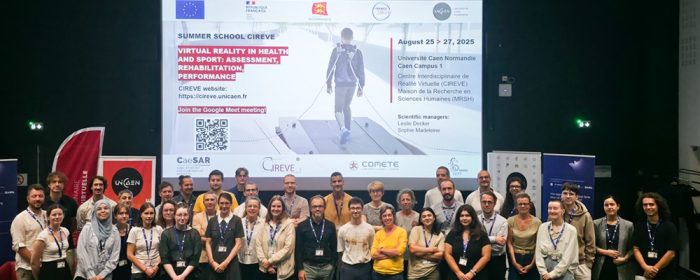Natalie L. Marchant is an Associate professor based in the Division of Psychiatry at University College London. There, she leads the Marchant Lab and chairs the UCL Research Culture Community Steering Group. From October 6th to 17th, Natalie Marchant was invited by the Neuropresage research team to work on a shared project: how thoughts and feelings impact brain health.
The importance of psychological well-being
How does lifestyle and mental health impact the way we age? Natalie Marchant has been addressing the question for years. As a research psychologist, she stands on the edge between psychology and neurosciences: “I study how psychological processes and neurological markers interact with each other.” To do so, Natalie Marchant uses specific tools from both sciences: “on the one hand, I use clinical diagnoses and psychological questionnaires that measure anxiety, depression and thinking styles; on the other hand, I monitor the physical brain with neuroimaging technologies such as magnetic resonance imaging (MRI) or positron emission tomography (PET). My aim is to highlight the link between psychological health and biological markers.”
As such, Natalie Marchant focuses on risk factors linked to dementia. “For instance, I have found that engaging in a high amount of repetitive negative thinking (RNT), persistent thoughts that are difficult to control and focus on negative themes, is associated with increased risk of neurodegeneration, cognitive decline and amyloid accumulation (a biological marker of Alzheimer’s disease).”
Ten years ago, Natalie Marchant’s work led her to give a conference to the Neuropresage team at University of Caen Normandy. There, she introduced her hypothesis on how RNT might be linked with brain health and risk of developing Alzheimer’s disease overtime.
A shared project with Neuropresage
From this first visit, a ten-year long collaboration was born: Natalie Marchant worked with Gaël Chetelat’s team on Medit-ageing. This research project proposed that meditation training could support mental wellbeing, cognitive and brain health in older adults. Moreover, to collaborate with Dr Chetelat to her hypothesis on RNT and aging, a questionnaire that assesses RNT was given to patients from one of Gaël Chetelat’s cohorts. With Gaël Chetelat focusing on neuroimaging, the questionnaire would highlight whether RNT was associated with brain health over time.
These last two weeks, Dr Marchant came back to the University of Caen Normandy to study the results of the questionnaires and neuroimaging.
For her first 2-week stay in a French university, Natalie Marchant could experience everyday life in a research unit at the University of Caen. “I was thrilled to meet with the vibrant scientific community of Neuropresage. I found myself working with the data again, thinking deeply how to analyse it, having very interesting conversations with fantastic researchers interested in complementary subjects as me…”
She observed, “In Neuropresage, the whole team works on similar subjects, so there’s a lot of collaboration and support, especially among PhD students.” Thanks to these complementary ideas, Dr Marchant discussed future potential collaborations to examine the relationship between RNT and blood-based biomarkers and sleep, “allowing more comprehensive perspectives on mental and brain health.”
As part of her visit, Dr Marchant also gave 2 conferences:
- A public talk about the importance of mental health in dementia prevention
- A lecture for students from diverse programmes of the Psychology faculty
Through these interventions, she was able to raise awareness on two-fold improvements for cognitive and brain health:
- Consider the importance of psychology in relation to dementia risk
- Improve behavioural and psychological interventions that could reduce risk factors
Towards more inclusive research and clinical practices
To make a difference, research has to broaden its recruitment practices, and Natalie L Marchant is committed to improve practices. As such, Dr Marchant also conducts work on how to improve inclusive research practices by working with patients that are most at risk (minoritised ethnic backgrounds, social deprivation, lower level of education…).
Including patients that are most at risk in research cohorts will allow to implement more accurate approaches and treatments to cognitive decline. “While mental health and dementia is increasingly addressed, there’s still work to do to ensure everybody, no matter their backgrounds, can access the support they need. The more inclusive research is, the more we will learn about diseases, disorders and risk factors, which will enable us to develop better treatments and provide patients with a panel of options that match their specific needs,” Natalie L Marchant explains.




